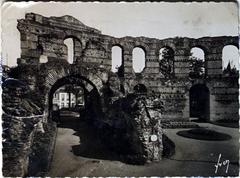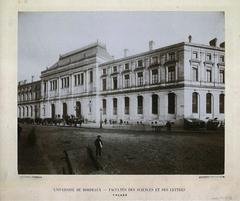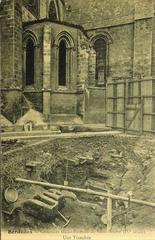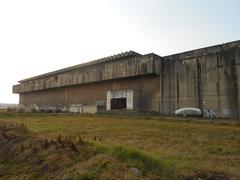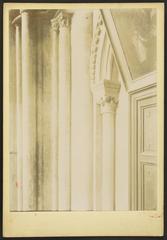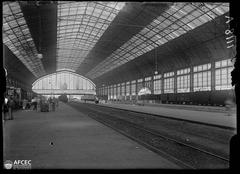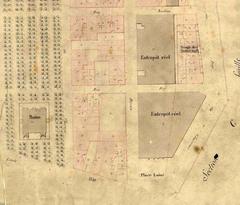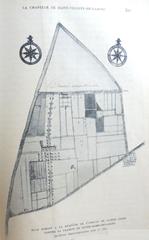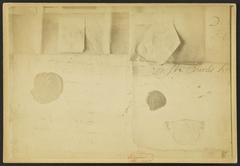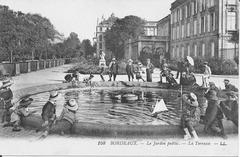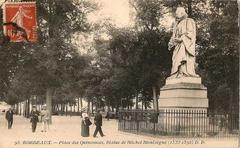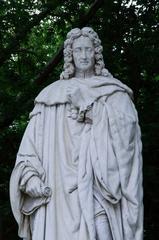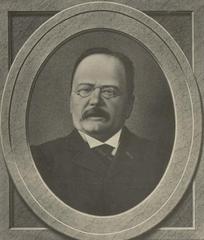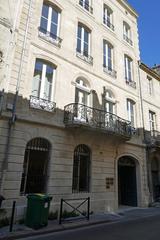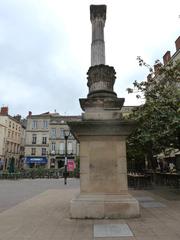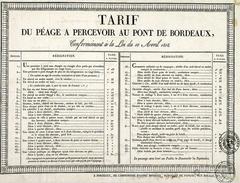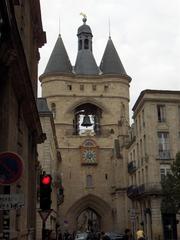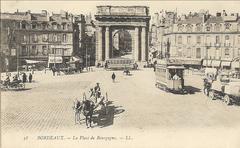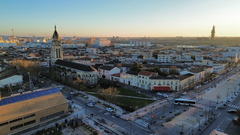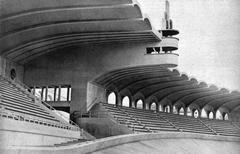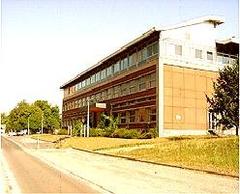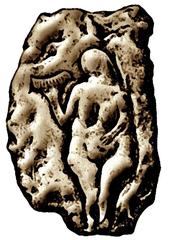
Grand Synagogue of Bordeaux: Visiting Hours, Tickets, and Historical Significance
Date: 03/07/2025
Introduction
The Grand Synagogue of Bordeaux stands as a monumental symbol of the city’s Jewish heritage, renowned for its architectural grandeur and the enduring spirit of its community. Built between 1877 and 1882, it reflects centuries of Jewish life in southwestern France, shaped by Sephardic migration, resilience in the face of hardship, and ongoing cultural renewal. Today, the synagogue welcomes visitors eager to explore its rich history, intricate architecture, and vibrant community life.
This comprehensive guide details everything you need to know for an enriching visit, including opening hours, ticketing, guided tours, accessibility, and visitor etiquette. For official updates, consult sources like the Bordeaux Synagogue page and Communauté Juive Aquitaine. Embark on a journey through Bordeaux’s Jewish legacy, set within the city’s multicultural and historical landscape. (Jewish Heritage Europe; Jewish Virtual Library; anr33.fr)
Table of Contents
- Introduction
- Historical Overview
- Architectural Features and Symbolism
- Religious and Community Life
- Visiting Information
- Nearby Attractions
- Frequently Asked Questions
- References
Historical Overview
Medieval Roots and Sephardic Migration
Jewish presence in Bordeaux dates back to at least the medieval era, with early communities benefiting from relative protection during periods of expulsion elsewhere in France. The community was notably shaped by the influx of Sephardic Jews from Spain and Portugal in the 16th and 17th centuries, who initially practiced their faith in secret and gradually gained rights, especially after the French Revolution (Jewish Heritage Europe).
By the 19th century, Bordeaux was a thriving center of Jewish life and commerce, with the 1810 inauguration of its first official synagogue. The city’s Jewish community played a significant role in the region, with Bordeaux becoming the seat of a consistory after the 1807 French Sanhedrin (Jewish Virtual Library).
Construction and 19th-Century Significance
A fire in 1873 destroyed the original synagogue, prompting the construction of the current Grand Synagogue. Designed by Charles Durand, construction began in 1877 and concluded in 1882. The building, officially inaugurated on September 5, 1882, is an architectural marvel that blends Romanesque and Byzantine elements, making it one of France’s largest and most impressive synagogues (Bordeaux.fr).
20th-Century Challenges and Preservation
During WWII, the synagogue and its community faced persecution and deportation. In 1949, a memorial was placed to honor local Holocaust victims. The building was listed as a historic monument in 1998, ensuring its preservation for future generations (Bordeaux.fr).
Architectural Features and Symbolism
The Grand Synagogue’s façade is monumental, adorned with arched windows, Jewish symbols—including a seven-branched menorah, Star of David, and Tablets of the Law—and Hebrew and French inscriptions. The interior, inspired by Byzantine basilicas, features a central nave supported by a concealed Gustave Eiffel metal framework, providing a vast open space without obstructive columns (anr33.fr; mahj.org).
Key elements include:
- Central estrade (tebah): Platform for Torah reading, typical of Sephardic synagogues.
- Holy Ark (Hechal): Lavishly decorated, housing twelve Torah scrolls.
- Women’s galleries: Located on the upper level, in accordance with tradition.
- Lighting and acoustics: Designed for natural illumination and optimal sound.
Auxiliary spaces include a winter synagogue, community rooms, and educational facilities. The building’s decorative motifs, such as menorahs and Stars of David, underscore its religious and communal identity.
Religious and Community Life
The synagogue serves as a vibrant hub for worship, religious education, and cultural gatherings. It hosts daily, Sabbath, and festival services, as well as life-cycle ceremonies. As the seat of the region’s Chief Rabbinate, it anchors a network of Jewish institutions and integrates newcomers from diverse backgrounds, including North African Jews in the 20th century (Jewish Virtual Library; Religion24).
The synagogue also commemorates the Holocaust, with a memorial for the 1,279 Jews deported from Bordeaux, and participates in interfaith and civic initiatives that foster dialogue and mutual respect.
Visiting Information
Hours and Admission
- Open: Monday to Thursday, 14:00–17:00 (last entry at 16:00; earlier closing during summer)
- Closed: Fridays, weekends, and Jewish religious holidays
Always confirm ahead for changes due to holidays or special events.
Tickets and Booking
- Admission: €5–9 for adults; €3–6 for students; free for children under 12; discounts for CityPass holders.
- Booking: Advance reservation is mandatory.
- Phone: +33 (0)5 56 91 79 39
- Email: [email protected]
- Virtual Tour: €4 (valid for 10 days; available in multiple languages).
Tours
- Guided Tours: Available in several languages by prior arrangement.
- Audio Guides: Provided on-site in French, English, Spanish, Hebrew, and Chinese (limited devices per language).
- Magazine: In-depth guide available for €10.
Accessibility
The synagogue is wheelchair accessible, though the entrance area is narrow. Visitors with mobility needs should contact staff in advance for assistance.
Visitor Etiquette
- Modest dress: Shoulders and knees covered.
- Men: Wear a head covering (kippa provided).
- Silence and reverence, especially during services.
- Photography is generally allowed but always confirm with staff.
- No food or drink inside.
- Phones should be silenced.
Nearby Attractions and Tips
- Nearby sites: Bordeaux Cathedral, Grosse Cloche, Place de la Victoire, historic Jewish cemeteries.
- Dining: Eden Cook kosher restaurant nearby (reservation required).
- Best times to visit: Weekdays outside of Jewish holidays and summer peak; book well in advance.
- Photography: Best in early afternoon for interior light.
Frequently Asked Questions (FAQ)
Q: What are the visiting hours?
A: Monday to Thursday, 14:00–17:00 (last entry at 16:00). Closed on weekends and Jewish holidays.
Q: How do I book tickets?
A: Reserve in advance via phone or email.
Q: Is the synagogue accessible?
A: Yes, but contact in advance for specific needs.
Q: Are guided tours in English available?
A: Yes, with prior notice.
Q: Can I take photos inside?
A: Generally allowed; always check with staff, especially during services.
References
- Bordeaux Synagogue page
- Jewish Virtual Library
- ANR33.fr - Synagogue
- Communauté Juive Aquitaine
- Jewish Heritage Europe
- Religion24
- Musée d’Art et d’Histoire du Judaïsme (mahj.org)
Conclusion
Visiting the Grand Synagogue of Bordeaux offers a unique window into the city’s Jewish history, architectural innovation, and vibrant cultural life. Whether attending in person or exploring via a virtual tour, the synagogue invites reflection on resilience, faith, and the diverse heritage of Bordeaux. Book in advance, respect visitor guidelines, and deepen your experience with official resources and guided tours. Complement your visit with nearby historical sites to fully appreciate Bordeaux’s multicultural tapestry.
For more information, download the Audiala app and stay updated through official channels. Make your visit to the Grand Synagogue a highlight of your Bordeaux journey.

